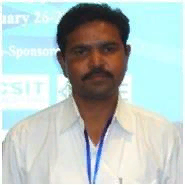
R. J. Ramteke
Work place: School of Computer Sciences, North Maharashtra University, Jalgaon (MS-India).
E-mail: rakeshj.ramteke@gmail.com
Website:
Research Interests: Image Processing, Image Manipulation, Image Compression, Pattern Recognition
Biography
R. J. Ramteke, male, is a Professor and Head of Department of Information Technology at School of Computer Sciences in North Maharashtra University, Jalgaon. He received the degree of Ph. D. (Comp. Sci.), M. Tech. (Comp. Engg.), M.Sc. (Comp. Sci.) from Dr. Babasaheb Ambedkar Marathwada University, Aurangabad (MS), India. He awarded UGC teacher research fellowship during 2004-2006. He achieved the best student paper award at IEEE International Conference on Cybernetics and Intelligent System (CIS-2006), Bangkok, Thailand. His areas of research interests are Image Processing, Pattern Recognition, Document Image Analysis and so on. He has published more than 87 research papers in journals and conferences. His professional and research experiences are above 20 years and 12 years respectively.
Author Articles
Efficient Model for Numerical Text-To-Speech Synthesis System in Marathi, Hindi and English Languages
By G. D. Ramteke R. J. Ramteke
DOI: https://doi.org/10.5815/ijigsp.2017.03.01, Pub. Date: 8 Mar. 2017
The paper proposes a numerical TTS-synthesis system in Marathi, Hindi and English languages. The system is in audible forms based on the sounds generated from several numeric units. A hybrid technique is newly launched for a numerical text-to-speech technology. The technique is divided into different phases. These numerical phases include pre-processing, numeric unit detection, numeric and speech unit matching; speech unit concatenation and speech generation. In order to enhance the syntactic generation of audible forms in three languages, two discipline tests were performed. The prosodic test has been obtained for evaluating on the statistical readings. Overall quality issue (OQI) test is a subjective test which is performed by various persons who are aware of three mentioned languages. On the basis of two distinct parameters of OQI test, all scores are positively provided. Initial parameter compromises with listening quality. The second parameter, awareness rate improves a level of the intelligibility. The ultimate satisfactory results of artificial sound generation in three unrelated languages were touched to humankind voice.
[...] Read more.Other Articles
Subscribe to receive issue release notifications and newsletters from MECS Press journals